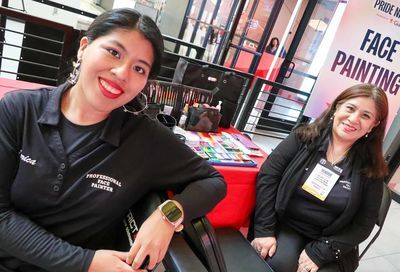Must-See LGBTQ Movies at the Film Maudit Festival
This year's Film Maudit features over 100 works of cinema from more than 25 countries, many of which are rarely screened.

In 1949, Jean Cocteau organized a festival to celebrate overlooked, shocking, and experimental works of cinema that the gay, influential avant-garde filmmaker named after a French phrase literally meaning “cursed films.”
Cocteau never got around to producing a second edition of the festival, which didn’t end up happening until just a few years ago, nearly 70 years after the original.
Revived by the L.A. nonprofit cultural center Highways Performance Space & Gallery, the showcase and celebration of outré films returns this year for a fourth edition that continues the pandemic-born innovation of offering both live, in-person screenings in Los Angeles as well as online streaming.
Notably, the entirety of this year’s programming is offered for free as a result of generous contributions from sponsors.
This year’s Film Maudit features over 100 works of cinema from more than 25 countries, many of which are rarely seen or screened otherwise, deemed too challenging or controversial by even preeminent international film festivals because of the way they address hot-button socio-political issues and taboo subject matter.
As an official description puts it, “the wide range of shorts, narrative, documentary, and experimental films selected are deliberately bold, extreme, confrontational, and unusual.”
A core aspect of the festival remains the Behold! Queer Film and Performance Series, presenting creative works, a mix of both performance and film art, from and about the LGBTQ and Latinx communities, grouped into three curated categories.
One such grouping, “1-900-BODY-ON-THE-Line,” explores the nuanced realm of fantasy, love, and validation from the perspective of “the outcast, sex worker/symbol, the working artist, the queer.”
Another, “Tight: An exploration of the architectures of restriction,” is a collection of shorts in which the protagonists, many of whom are queer, nonbinary, or trans, find themselves “trapped by the limits of the gendered gaze, of memory, of the COVID-19 shelter-in-place lockdown, or of mysterious situations beyond their control.”
Meanwhile, “Ecstasy and Reminiscence: Nights Out in Los Angeles” features works linked to queer L.A. culture and nightlife, including a screening of Artbound: Mustache Mondays, Marianne Amelinckx’s documentary, which aired on PBS in 2021, about a roving queer club event in L.A. that improbably served as a creative incubator for today’s leading-edge contemporary artists; and an installation of candid photos and video, flyers, and music from queer Latinx nightlife in L.A. from the late 1980s to 2000s.
Another shorts program, “Cocteau Land,” features two films of LGBTQ interest, including Chaerin Im’s Eyes and Horns, a Picasso-inspired work of animation in which the transformation of the over-masculine Minotaur leads to the destruction of boundaries of sexes, and Mathieu Morel’s La Belle et La Bête, a twist on the classic tale of Belle-Rose that goes beyond today’s popular Disney-fied version, here “composed by and for grown-ups” and carrying the warning: “some images are likely to offend homophobic sensitivity.”

Among the feature-length films with LGBTQ themes are Holy Mother, a unique stylistic blend of drama/horror/comedy from Japanese filmmaker and make-up artist Yoshihiro Nishimura whose protagonist is a transgender woman willing to defend the Yakuza mafia tradition against a racist corporation looking to expand its territories of domination, and The Attachment Diaries (El apego), a campy mystery by Argentinian director Valentin Javier Diment, dubbed a “queer erotic thriller” by festival organizers, focused on two troubled women on the edge in the 1970s whose lives intersect and intertwine in increasingly vicious and dangerous ways.
Also of LGBTQ interest is the second of two Filmmaker Retrospectives focused on the work of German filmmaker Jan Soldat, known for documentary works dealing with the depiction of diverse sexual practices and preferences.
“My films are about authority, control, and power,” Soldat says. “It’s not just about dominance and submission, it’s also about being active and passive…. Most people say their relationship is not about these things, but I think every relationship is. We have to confront them, call them out for what they are.”

Streaming begins Thursday, Jan. 12, and has been extended to February 11. Free. Visit www.filmmaudit.org.
For the virtual festival, visit https://watch.filmmaudit.org.
Support Metro Weekly’s Journalism
These are challenging times for news organizations. And yet it’s crucial we stay active and provide vital resources and information to both our local readers and the world. So won’t you please take a moment and consider supporting Metro Weekly with a membership? For as little as $5 a month, you can help ensure Metro Weekly magazine and MetroWeekly.com remain free, viable resources as we provide the best, most diverse, culturally-resonant LGBTQ coverage in both the D.C. region and around the world. Memberships come with exclusive perks and discounts, your own personal digital delivery of each week’s magazine (and an archive), access to our Member's Lounge when it launches this fall, and exclusive members-only items like Metro Weekly Membership Mugs and Tote Bags! Check out all our membership levels here and please join us today!



















You must be logged in to post a comment.